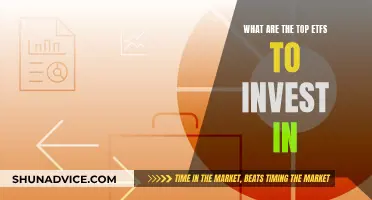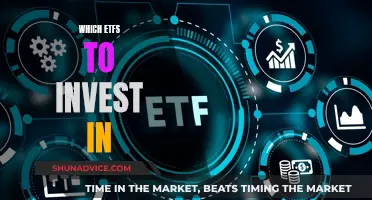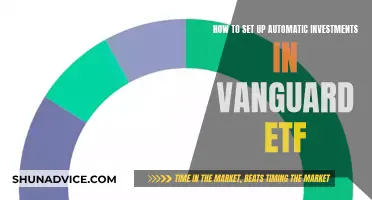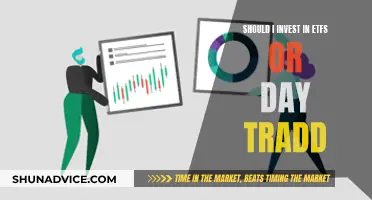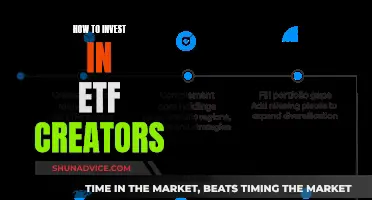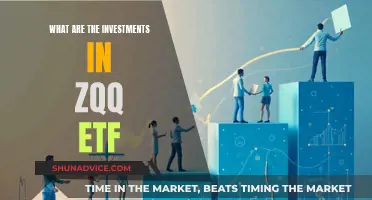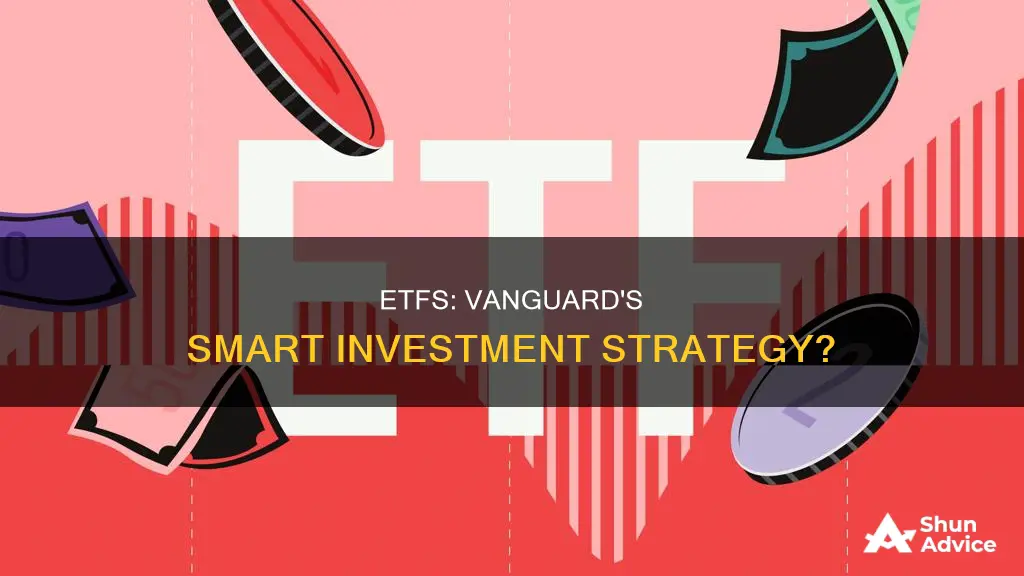
Exchange-traded funds (ETFs) are a collection of hundreds or thousands of stocks or bonds, managed by experts, in a single fund that trades on major stock exchanges. Vanguard, a private company that is owned by its investors, offers ETFs that combine the diversification of mutual funds with real-time pricing and an investment minimum of just $1. Vanguard is well-known for running some of the largest and most prominent ETFs on the market, with over 80 ETFs to choose from.
Vanguard's ETFs are designed to cater to investors with different financial goals and preferences. They offer broad market ETFs, such as ones that track the S&P 500, as well as sector-specific ETFs like oil, commodity, and clean energy ETFs. Vanguard also offers low-cost, fixed-income options and innovative active funds alongside its strong selection of passive index ETFs.
Vanguard's ETFs provide benefits such as diversification, low costs, and the ability to trade shares during the trading day. They can be a good investment option for those looking to invest over a long period, as they tend to be safer than individual stocks due to their diversification.
To invest in Vanguard ETFs, individuals need to open a brokerage account, either directly with Vanguard or with another broker. It is important for investors to consider their financial goals, risk tolerance, and time horizon when investing in Vanguard ETFs or any other financial product.
| Characteristics | Values |
|---|---|
| Minimum investment | $1 |
| Diversification | ETFs offer diversification |
| Costs | Low costs |
| Trading | Ability to trade shares live during the trading day |
| Buying | Buying a fractional share of a Vanguard ETF for as little as $1 |
| Number of ETFs | 88 options |
| Management | Professionally managed |
| Taxation | Tax-efficient |
| Commission | Commission-free |
| Liquidity | Higher liquidity |
| Flexibility | Trading flexibility |
| Expense ratios | Competitive expense ratios |
What You'll Learn

Vanguard's ETFs offer diversification and low costs
Vanguards ETFs offer diversification and low costs.
Vanguard's ETFs (exchange-traded funds) combine the diversification of mutual funds with real-time pricing and an investment minimum of just $1. An ETF is a collection of hundreds or thousands of stocks or bonds, managed by experts, in a single fund that trades on major stock exchanges.
ETFs offer diversification, allowing investors to buy a fractional share of a Vanguard ETF for as little as $1. This gives investors access to a wide range of stocks or bonds across different sectors, regions, and company sizes.
Vanguard is well-known for running some of the largest and most prominent ETFs on the market, and the company continues to expand its ETF lineup. Vanguard's future ETF lineup is likely to continue emphasizing low-cost, fixed-income options and innovative active funds alongside its strong selection of passive index ETFs.
Vanguard's average ETF expense ratio is currently 75-77% less than the industry average, making their ETFs a low-cost option for investors.
- Vanguard Total Stock Market ETF (VTI): This ETF offers diversification across more than 3,000 market-cap-weighted large-, mid-, and small-cap stocks from all 11 stock market sectors. It has a low expense ratio of 0.03%.
- Vanguard FTSE All-World ex-US ETF (VEU): This internationally diversified ETF offers exposure to more than 3,800 stocks from both developed and emerging markets, traded in U.S. dollars. It has a slightly higher expense ratio of 0.07%.
- Vanguard Total Bond Market ETF (BND): BND is a fixed-income ETF that tracks more than 11,300 government, mortgage-backed, and investment-grade corporate bonds of multiple maturities. It has a low expense ratio of 0.03%.
- Vanguard Total International Bond ETF (BNDX): BNDX is a global bond ETF that covers the investment-grade bond market in developed and emerging markets. It has a slightly higher expense ratio of 0.07% to account for the cost of trading international equities.
- Vanguard ESG U.S. Stock ETF (ESGV): This ETF offers exposure to environmental, social, and governance (ESG) strategies by tracking an ESG-focused benchmark. It holds approximately 1,500 stocks that meet human rights, fair labor, environmental, and anti-corruption principles. It has a low expense ratio of 0.09%.
These examples demonstrate how Vanguard's ETFs provide investors with access to a diverse range of stocks, bonds, and other assets at a low cost, making them a compelling investment option.
SPDR ETF: A Guide to Smart Investing
You may want to see also

You need a Vanguard Brokerage Account to buy an ETF
To buy an ETF, you need a Vanguard Brokerage Account. If you already have a brokerage account with Vanguard, you can enter the ETF trade path through the Buy & Sell page when logged in to your account. If you're new to investing with Vanguard, you can open an account and start investing.
Opening a brokerage account with Vanguard is a straightforward process that can be done online in about 10 minutes. You'll need some information to be readily available, such as your Social Security and bank account numbers.
It's important to note that you can also buy Vanguard ETFs through another broker, but they may charge commissions. Vanguard offers commission-free trades when you buy or sell ETFs online through Vanguard Brokerage Services.
Before investing, it's always a good idea to understand the different types of investment accounts and choose the one that aligns with your financial goals. For example, Vanguard offers general investing accounts, joint and individual accounts, Roth and traditional IRAs, and other types of accounts like trust and organization accounts.
Additionally, when investing in ETFs, it's essential to consider the associated fees and minimums. While Vanguard ETFs have a low investment minimum of just $1, there may be other costs to consider, such as expense ratios.
Remember, investing carries risks, and it's important to do your research and understand the potential benefits and drawbacks before committing your money.
VIX ETF Investment: Strategies for Beginners
You may want to see also

ETFs are subject to market volatility
When buying or selling a Vanguard ETF, you will pay or receive the current market price, which may be more or less than the net asset value. This is because ETFs are subject to market volatility.
ETFs are collections of hundreds or thousands of stocks or bonds, managed by experts, in a single fund that trades on major stock exchanges. They are similar to mutual funds in many ways, but there are some key differences. ETFs offer diversification, low costs, and the ability to trade shares live during the trading day. They are also more tax-efficient than trading individual stocks or bonds.
Vanguard ETFs are funds that group assets, such as stocks or bonds, into one investment. By investing in a Vanguard ETF, investors can instantly diversify their portfolios. The provider, in this case, Vanguard, owns the underlying assets and creates a fund that tracks their performance. Buyers and sellers then trade the ETF throughout the day on an exchange, much like a stock.
While Vanguard is a fund provider with a reliable company history, and well-diversified ETFs tend to be safer than individual stocks, ETFs are still subject to market volatility. If you are considering investing in Vanguard ETFs, it is important to keep in mind that you will pay or receive the current market price, which may be more or less than the net asset value.
Vanguard has more than 80 ETFs to choose from, and you can buy a fractional share of a Vanguard ETF for as little as $1.
A Simple Guide to Index ETF Investing
You may want to see also

Vanguard has a positive reputation among investors and financial experts
Vanguard is also known for its large selection of low-cost funds, making it ideal for long-term investors. Its average ETF expense ratio is 75-77% less than the industry average. Vanguard's mutual funds and ETFs are not just low cost; they are significantly less expensive than the industry average. The average expense ratio for a Vanguard fund is 0.09%, compared to the industry average of 0.36%.
Vanguard's mobile app and website are not the best in class, but they serve the company's target audience of long-term, hands-off investors looking for minimal fees. Vanguard makes it easy to set up automatic contributions and offers a suite of low-expense-ratio ETFs that could form the backbone of a diversified portfolio. Additionally, Vanguard offers several advisory service tiers as your balance increases over time.
Vanguard is also trusted by investors because it does not accept payment for order flow. This means that the company does not receive compensation from market makers, staying true to its client-first philosophy.
Vanguard has also been awarded "#1 Most Trusted Financial Companies – ETF/Fund Companies" in 2022 by Investor's Business Daily (IBD).
A Beginner's Guide to Investing in ETFs in Nigeria
You may want to see also

ETFs are a good option for investors who want to trade shares during the trading day
Exchange-traded funds (ETFs) are a good option for investors who want to trade shares during the trading day. ETFs offer several advantages that make them a popular choice for investors seeking flexibility and diversification.
One key benefit of ETFs is their ability to provide diversification within a portfolio. An ETF typically consists of a collection of hundreds or thousands of stocks or bonds, allowing investors to access a diverse range of assets with a single investment. This diversification helps to reduce risk by spreading it across multiple securities.
ETFs also offer low costs, making them accessible to a wide range of investors. The investment minimum for ETFs can be as low as $1, and ETFs generally have lower expense ratios compared to other investment options.
Additionally, ETFs provide the advantage of real-time pricing and trading throughout the day. Unlike mutual funds, which can only be bought or sold once per day at market close, ETFs allow investors to buy or sell at any time during the trading day. This flexibility is particularly attractive to active traders who want to take advantage of short-term market movements.
ETFs are also highly liquid, meaning they can be easily bought or sold without significantly impacting the market price. This liquidity, combined with low transaction costs, makes ETFs suitable for day trading strategies.
Furthermore, ETFs offer a wide range of investment options. They are available for various asset classes, including equities, stocks, bonds, commodities, and cash. Investors can also find ETFs that track specific indexes, such as the S&P 500, or focus on particular sectors, regions, or investment themes.
Overall, ETFs are a good option for investors seeking diversification, low costs, and the ability to trade shares during the trading day. They provide flexibility, liquidity, and a wide range of investment choices, making them a popular tool for investors looking to actively manage their portfolios.
Invest Wisely: SP500 ETF Strategies for Beginners
You may want to see also
Frequently asked questions
ETFs offer diversification, low costs, and the ability to trade shares live during the trading day. You can also buy a fractional share of a Vanguard ETF for as little as $1.
You'll need to have a Vanguard Brokerage Account to buy an ETF through Vanguard. If you already have a brokerage account with us, you can enter the ETF trade path through the Buy & Sell page when you're logged in to your account. If you're not yet an investor with us, you can open an account and begin investing through our website.
Vanguard has over 80 ETFs to choose from. Some of the best-performing Vanguard ETFs include the Vanguard Total Stock Market ETF (VTI), Vanguard Total Bond Market ETF (BND), Vanguard Total International Stock ETF (VXUS), and Vanguard S&P 500 ETF (VOO).


